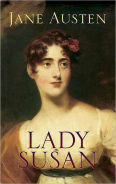I recently saw the film Love and Affection, which is not based on Austen’s novel of that name, but rather on her epistolary novel Lady Susan. The film seemed odd to me and a bit boring, aside from some very broad humor, so I immediately went home and read the novel for the first time.
As so often happens, I wish I’d read it before seeing the film. The story begins with the recently widowed Lady Susan and her daughter Frederica leaving Langford, where they had been visiting the Manwarings. Lady Susan sends Frederica off to school and goes on an extended visit to her brother, Charles, at Churchill. We learn rather quickly that Lady Susan not only has been receiving Lord Manwaring’s “attentions”, but has also detached the wealthy Sir James Martin from Miss Manwaring and persuaded him to propose to Frederica. Frederica, “born to be the torment of my life” as Lady Susan says, violently rejects the proposal.
So we have a fairly standard gothic plot of a heroine being forced into an unwelcome marriage, except here it is by her mother rather than the usual father/uncle/guardian. Also unusual is that Frederica is not the protagonist of the story; we only hear from her once in the novel.
In the film, Lady Susan is presented as being deliberately amoral, fully aware and proud of her ability to twist events and actions to pretend that she is the one behaving properly. She comes off as a proper villainess, like Madame de Merteuil in LaClos’s Dangerous Liaisons, published in 1782 and immediately translated into English and widely read.
Yet, in the novel, this wickedness is not so obvious. The most interesting justifications come in her letters to her friend, Alicia Johnson, with whom one would think she would be more open. Is Lady Susan deceiving herself as well as her friend when she presents herself as a martyr trying only to do what is best for everyone? I have certainly known individuals with an immense capacity for self-deception. And Lady Susan, as a widow with a grown daughter and no money, is in a vulnerable position in a world that offers no hope for survival in such a situation except relying on the kindness of friends and family.
In her biography of Jane Austen, Carol Shields says of this book:
The novel, never published during her lifetime, is her strangest and most unsettling literary offering and seems to have been unpopular with her family and friends. It is charmless. And very nearly pointless . . . [Lady Susan] shows not the slightest degree of shame or self-awareness as a reader might have expected by the novel’s end, and Jane Austen does not mete out to her what would be an appropriate punishment. It may be that Austen half admired her creation’s mixture of cunning and sexual bravura; Lady Susan was at least capable of exercising power—even though this force was chiefly directed at breaking up homes and managing her daughter’s misery.
Austen scholar Ellen Moody offers a different view:
The real problem in the novel is there are no good choices. . . There is a quiet desperation here, a disjunction between the stereotype she [Austen] found in her culture and what she wanted to say . . . My suggestion was it’s a radical inverted protest novel. Austen is getting away with protesting her own and other women’s situations through presenting a heroine all will detest.
I appreciate the ambiguity of the novel over the shallowness of the film. As Ellen Moody points out, “If you read Lady Susan as tongue-in-cheek, and . . . think that Lady Susan speaks ceaselessly as a conscious hypocrite and never believes a word she says about her emotions, she becomes a wild caricature. It seems improbable to me – you could not find any depth in the novel then.” Instead, you can “read Lady Susan’s letters as partly self-righteous, at times fooling herself (as people do), really half-believing herself a misunderstood person trying her best to survive and dealing with a society indifferent to her, and only facing up to her hypocrisy when forced to.”
Shields dates the novel from around 1795, but Moody makes a good case for it being set in 1804-5, including there a calendar of the events in Lady Susan.
Ellen Moody also has completed a close reading of Jane Austen’s letters, posted on her Reveries Under the Sign of Austen blog, which Austen fans might enjoy. It begins here.
Have you seen the film Love and Affection? What did you think of it?

